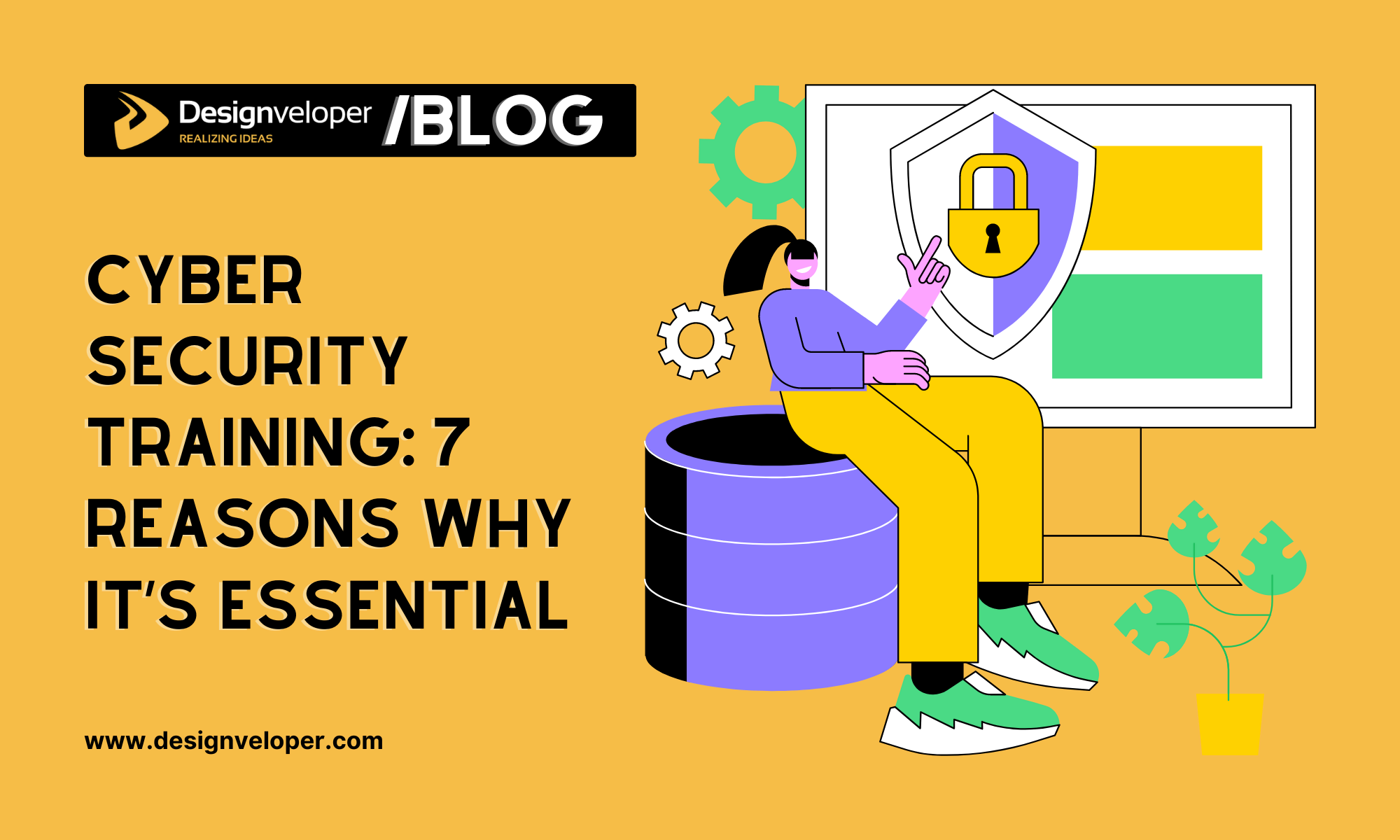


Cyber security training has become popular as an organizational imperative as the Internet continues to develop at a breakneck pace. Seven fascinating reasons in this article from Designveloper elaborates on why it is essential for your organization.
According to the latest evidence and statistics, the incidence of cybercrime has risen significantly. A survey conducted in 2022 revealed that currently, 97 percent of organizations incorporated some type of cybersecurity training. Still, according to the data provided by IBM, the average cost of data breach in 2023 was $4.45 million. These statistics hence explain why understanding the importance of comprehensive cyber security learning is crucial.
Now let us probe what cyber security training is. It stands for a tool which is quite handy in the methodology of software development and provides insights regarding security and methods pertaining to data protection. They comprise the support and actions related to the use of computers, programs, and Internet based applications.

Cyber security training helps prepare people in social cyber security or how to safeguard digital resources from various threats. It encompasses general knowledge, broad sectoral, and expertise and skills in specialized occupational areas. It is crucial in minimizing the threats associated with security interests, as well as ensuring compliance with sector norms and enhancing the general security profiles.
The common areas for cyber security training include the storage and archiving of data and records, installation, and password policies. For example, during acquisitions teams can also find out how to monitor and manage company data safely. They also learn how to load additional software applications and program installation from outside the firm on organizational computers securely.
Furthermore, basic password protection forms part of cyber security training known to many people in the world. With cyber security training, the employees will be in a position of understanding security threats involved in their day-to-day activities and how to avoid them.
Cyber security training has several objectives and is highly relevant to an organization’s security defense. This training is helps people become aware of risks in general security and how they can control those risks. It is aimed at arming teams with information and skills to help them recognize threats, including cyberterrorism, data leak, and phishing attacks.
Cyber security education is one of the most effective ways to enhance the general population’s understanding and in turn change the behavioral patterns in a way that contributes to minimizing information security threats. It is more about implementing cybersecurity as the basis of work activities and processes in the organization.
For example, employees become aware of how to track and contain data belonging to a company safely. They also grasp the need to safely install third party apps and software programs into company computer systems. Furthermore, password security is perhaps one of the important aspects that a student is likely to learn in a cyber security class.
Cyber security training leads to harm reduction to the organization, clients, shareholders, and other stakeholders, as well as the reduction of human cyber risk.
As we delve into the heart of our discussion, let’s explore the seven essential reasons why cyber security training is a non-negotiable aspect of any organization’s security strategy.
The first and the most obvious reason why people must undergo cyber security training is the simple fact that cyber security training serves as one’s first line of defense against various cyber threats. The level and intensity of threats in cyberspace are increasing day by day and new and more sophisticated threats are emerging. A survey in 2023 showed that a third of the companies failed to offer cybersecurity education for the workers at a distance, although 75% of these companies’ remote workers dealt with the sensitive information.

The cyber security training enables creation of human firewall as a result of awareness of common security risks by employees. It makes it easier for them to know when there is a tactic like phishing emails, malicious websites or social engineering that can exploit the system. When the workers are trained on the potential weak spots that attackers usually target, the possibility of getting breached is substantially minimized.
For example, it is crucial that various categories of threats are clearly distinguished in order to provide adequate protection measures. Some of the most frequent types of risks that companies may face are viruses, phishing, ransomware, and social engineering. This informs organizations on how to protect themselves well from attacks through the update nature of threats.
The second rationale explaining why cyber security training is mandatory for organizations is its application in meeting the legal requirements. In the present day context where data protection is of paramount importance a company has to ensure that it operates under a legal umbrella that will govern the framework of the laws, regulations and guidelines that support the company on its measures on cyber security.
Cybersecurity compliance describes the set of regulations that dictate the conduct of individuals and organizations staying safe from cyber threats and cyber incidents. It entails the proper setup and enforcement of controls, policies, procedures, as well as technologies that support the protection of confidential information.
For compliance, therefore, one has to work continuously to evaluate the need for its application and changes to fit new weaknesses, newer threats that may exist and changes in the regulatory structures. It’s important for organizations to engage in assessments of the security measures and steps taken periodically to assure them that they meet the security standards laid down by the regulatory bodies, industry standards or by the organizational policies.
The goal of cybersecurity compliance is twofold: to control the access, collection, storage, distribution, use and disposal of information in order to preserve its reliability, security and accessibility and to maintain organizations’ compliance with legal and regulatory requirements. This can help to avert possible fines, penalties, and even a bad reputation largely due to non- compliance.
Compliance frameworks depend on the sector of the economy, geography, and data type that firms need to manage, with some of the most recognized global frameworks being GDPR in the EU, HIPAA in the US, and PCI DSS globally.
The third rationale for the importance of cyber security training is the protection of data and information that are often critical. Given that in the modern world, data is recognized as humanity’s most valuable asset, it is crucial to safeguard it from leak.
Cyber security training focuses on familiarizing the staff members with ways of handling the company information safely. Some of the important aspects discussed include data and records management, installation procedures, and password security measures. For example, the teams get to know the best ways to regulate and even protect company information. They also know what measures to take to install various third party applications and programs on the business computers safely.
Furthermore, password security is another fond topic in cyber security training. The best-curated and well-explained topics help the employees to better understand the potential security threats that may be inherent in their activities.
The fourth reason as to why cyber security training is crucial is in the key part it plays in the creation of customer confidence. In today’s world where everything is shrinking into screens and people rely and base their trust in digital businesses and services, cybersecurity becomes one of the most important assets.
Cyber security can start with training your team, and that shows your customers that they can trust you with their sensitive information. This can help in the development of brand loyalty and repeated customer patronage due to the trust that they have placed on the brand.
Cybersecurity stands out as a crucial element when using the internet platforms for any business in order to gain customer loyalty. Measures of protection ensure confidentiality of information, defend the company against cyber risks, enable forecasting risks and strengthen confidence in the company among clients.
The fifth argument supporting the importance of cyber security training is that it can minimize insider threats. Internal threats, particularly from insiders who exploit their legitimate access violate security policies, are equally dangerous to the organization.
Insider threat protection incorporates physical safeguard, personnel sensitivity, and information-based concepts. It includes; describing, recognizing, identifying, evaluating, and dealing with possible insider threats. It is important for organizations to incorporate specific employee training alongside advanced technologies to address threats located on cloud, email, endpoints, and web in order to come up with a more effective solution towards insider threats.
For example, an employee that may be aware or may contribute to the organization’s products or services may be an insider menace. This group refers to people who have insider knowledge about products that bring value to the organization.
Another important reason to support the need for cyber security training is that it is the key in changing the security culture. Cultural change for cybersecurity goes beyond awareness; it calls for a change in perception and expectations of the workforce.

By effectively establishing and maintaining a security culture, one is also effectively decreasing enterprise risk and potentially saving milions of dollars solely in the areas of corrupted or lost data, revenue, regulatory fines for non-compliance, and protecting enterprise reputations. It is about treating cybersecurity not as something separate, but as a core element of the organization’s processes and procedures.
For example, in a big circulation bank, the president starts each meeting with the participation of the entire staff with a story about cyber threats. This means that cybersecurity is essential and lies at the heart of operations for every employee of the organization. In another company, a former marketing manager leverages the skills to develop communication campaigns which educate employees the importance of cyber preparedness and the role which they play.
Thus, making the vision of risk-speaking culture effective in engaging and involving employees with proper rewarding is an incredibly crucial element in achieving the goals of a strong cyber security culture. This means by the time employees feel at liberty to express their concerns and report incidents they consider as suspicious, organizations are in a good chance to affect security in the coming moments.
The final compelling argument for cyber security training is continuous shifting of threats in technology. Cyberspace is the wide, menacing land of opportunities and challenges that is in constant and organic evolution. In today’s world, threats in cyberspace are defying all odds and are emerging to be more dangerous and challenging to counter.
According to a survey conducted in 2023, they found out that 83% of the organizations they considered in this study, have experienced at least two data breaches. Therefore, even to date, the endpoints continue to become the attack vector of preference with 84% of security professionals being unanimous in their opinion in the fact that most attacks shall start with the endpoints. This shows the importance of improving the existing and developing new and more effective cyber security training regimes.
Awareness training can help form a human firewall, as this will ensure that most personnel within the organization recognize various risks. They suggest them concerning information that can help realize possible dangers like phony emails, destructive websites and social manipulation. Several websites have been produced with the aim of teaching employees critical details about attackers’ favorite strategies, and by doing so, organizations can minimize the chances of a successful penetration.
To illustrate, expertise in various kinds of threats is critical in helping organizations establish sound protection measures. Some of the often identified cyber threats include viruses, worms, trojans, spoofing, phishing, virus attacks, malicious emails and messages, emails containing virus links, and virus attachments. This is because organizations can be able to guard against certain menaces with relative ease by ensuring that they rate the different threats.
At Designveloper, we believe that cyber security training is an essential aspect of fulfilling our mission in the modern world. We are proud to be Vietnam’s premier web and software development company and focused on delivering comprehensive cyber security training services.
Our cyber security training services prepare your team to prevent security breaches that puts your organizations digital equity at risk. We do agree that possibly this is the most practical approach to protecting an organization against cyber threats: a well-trained workforce.

By drawing from our decade-long experience in the tech industry our team has designed a detailed training program that touches on almost every aspect of cybersecurity from foundational cyber security hygiene to sophisticated tactics for dealing with threats at our high-risk clients. This training schedule is under continuous enhancement to ensure that it is on par with current threats.
Here at Designveloper, we offer very customizable cyber security training according to your needs.
Here at Designveloper, we have our secure coding training as one of the services within our unique cyber security training. This training aims at providing developers with adequate knowledge and skills they need to implement secure code and avoid making mistakes that would result in creating bugs or open vulnerabilities in their program.
Secure Coding Training encompasses theoretical and practical areas of Coding, standards such as OWASP best practices and several tools to ensure secure coding. It is appropriate for software developers, project managers, or software architects to have the knowledge to create secure apps.
Of course, such threats are constantly updating, and it is clear that the threat of virus attacks is not the only one. That is why the training of the staff is conducted continuously and the program is being adjusted regularly in order to face new threats and risks. In our training, we offer numerous practice exercises involving the usage of WebGoat, an OWASP project intended to embody penetration testing.
Cyber threats have become rampant in almost all organizations, and at Designveloper, we recognize that awareness is the best way to deal with these threats. That is why at ACDC, we provide detailed Security Awareness Training as one of the services in our diverse cyber security training.
Therefore, our training is focused to address the different types of threats employees can experience and how to deal with them. We are regularly preparing articles on different subjects such as: phishing scams, malware attacks, etc. to offer the best information to our employees so that they can protect themselves and the organization.
We know that cybersecurity threats are active and that new forms of threats appear in the course of time. That is why the training program is constantly being updated so that it addresses the threats and possible vulnerabilities of today.
Incident Response Training is another feature of the cyber security training services we provide at Designveloper. This training should help your team be ready in the event that your organization experiences a cyber attack.
Incident Response Training offered by our company comprises several areas, including threat identification and analysis and response plan development. It is intended for IT specialists, security specialists, and other personnel who are to deal with a cyber attack.
We also know that threat models are not static and new challenges appear regularly. That is why our training program is under constant development in order to respond to the modern threats and risks as quickly as possible. Several practice activities are available in our training program; these are role-play, realistic cases, and more.
Among the cyber security training offered by the company, Designveloper also conducts Threat Modeling Training. This training is aimed at ensuring your team understands the risks and the different ways in which they can be mitigated before they result in a security breach.
The Threat Modeling Training program provides a comprehensive and detailed approach to a threat landscape and potential works through and includes suggestions and recommendations for appropriate defense mechanisms. The program is valuable for IT workers, security experts, and every person, who adheres to the company’s cybersecurity management.
This means that there are new threats as well as existing threats that are getting more sophisticated every other day. That is why our training and continuing education program is current now and is updated regularly to coincide with present threats and exposures. It is important to mention that our training program contains a sufficient amount of practice-based activities as well as realistic cases.





